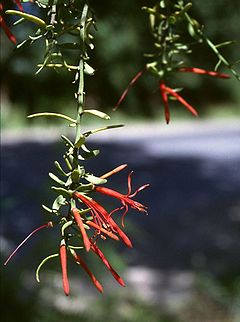Loranthaceae
| Règne | Plantae |
|---|---|
| Sous-règne | Tracheobionta |
| Division | Magnoliophyta |
| Classe | Magnoliopsida |
| Sous-classe | Rosidae |
| Ordre | Santalales |
| Clade | Angiospermes |
|---|---|
| Clade | Dicotylédones vraies |
| Clade | Noyau des Dicotylédones vraies |
| Ordre | Santalales |
| Famille | Loranthaceae |
La famille des Loranthacées regroupe des plantes dicotylédones ; elle comprend un millier d'espèces réparties en près de 70 genres.
Ce sont des arbres, quelques lianes et pour la plupart des arbustes ou des arbrisseaux, parfois aux feuilles réduites (la photosynthèse se faisant dans les tiges), sans vraies racines, souvent semi-parasites des parties aériennes de l'hôte ou dans quelques cas des racines, aux feuilles persistantes. On les rencontre dans les régions tempérées chaudes à tropicales.
Étymologie
[modifier | modifier le code]Le nom vient du genre type Loranthus composé du grec λορος / loros (racine latine lorum), sangle, ceinture, et du suffixe grec νθος / anthos, fleur, en référence à la forme des pétales de ses fleurs.
Liste des genres
[modifier | modifier le code]Selon NCBI (29 avr. 2010)[1] :
- Actinanthella
- Aetanthus
- Agelanthus
- Alepis
- Amyema
- Amylotheca
- Atkinsonia
- Bakerella
- Barathranthus
- Baratranthus
- Benthamina
- Berhautia
- Cecarria
- Cladocolea
- Dactyliophora
- Decaisnina
- Dendropemon
- Dendrophthoe
- Desmaria
- Diplatia
- Emelianthe
- Englerina
- Erianthemum
- Gaiadendron
- Globimetula
- Helicanthes
- Helixanthera
- Ileostylus
- Ixocactus
- Lepeostegeres
- Lepidaria
- Ligaria
- Loranthus
- Loxanthera
- Lysiana
- Macrosolen
- Moquiniella
- Muellerina
- Notanthera
- Nuytsia
- Oedina
- Oliverella
- Oncella
- Oncocalyx
- Oryctanthus
- Peraxilla
- Phragmanthera
- Phthirusa
- Plicosepalus
- Psittacanthus
- Scurrula
- Septulina
- Socratina
- Sogerianthe
- Spragueanella
- Struthanthus
- Tapinanthus
- Taxillus
- Tolypanthus
- Tripodanthus
- Tristerix
- Tupeia
- Vanwykia
Selon Angiosperm Phylogeny Website (21 mai 2010)[2] :
- Actinanthella Balle
- Aetanthus (Eichler) Engl.
- Agelanthus Tiegh.
- Alepis Tiegh.
- Amyema Tiegh.
- Amylotheca Tiegh.
- Atkinsonia F.Muell.
- Bakerella Tiegh.
- Barathranthus (Korth.) Miq.
- Benthamina Tiegh.
- Berhautia Balle
- Cecarria Barlow
- Cladocolea Tiegh.
- Cyne Danser
- Dactyliophora Tiegh.
- Decaisnina Tiegh.
- Dendropemon (Blume) Rchb.
- Dendrophthoe Mart.
- Desmaria Tiegh.
- Diplatia Tiegh.
- Distrianthes Danser
- Elytranthe (Blume) Blume
- Emelianthe Danser
- Englerina Tiegh.
- Erianthemum Tiegh.
- Gaiadendron G.Don
- Globimetula Tiegh.
- Helicanthes Danser
- Helixanthera Lour.
- Ileostylus Tiegh.
- Ixocactus Rizzini
- Kingella Tiegh.
- Lampas Danser
- Lepeostegeres Blume
- Lepidaria Tiegh.
- Ligaria Tiegh.
- Loranthus Jacq.
- Loxanthera (Blume) Blume
- Lysiana Tiegh.
- Macrosolen (Blume) Rchb.
- Moquiniella Balle
- Muellerina Tiegh.
- Notanthera (DC.) G.Don
- Nuytsia R.Br. ex G.Don
- Oedina Tiegh.
- Oliverella Tiegh.
- Oncella Tiegh.
- Oncocalyx Tiegh.
- Oryctanthus (Griseb.) Eichler
- Oryctina Tiegh.
- Panamanthus Kuijt
- Papuanthes Danser
- Pedistylis Wiens
- Peraxilla Tiegh.
- Phragmanthera Tiegh.
- Phthirusa Mart.
- Plicosepalus Tiegh.
- Psathyranthus Ule
- Psittacanthus Mart.
- Rhizomonanthes Danser
- Scurrula L.
- Septulina Tiegh.
- Socratina Balle
- Sogerianthe Danser
- Spragueanella Balle
- Struthanthus Mart.
- Tapinanthus (Blume) Blume
- Taxillus Tiegh.
- Tetradyas Danser
- Thaumasianthes Danser
- Tolypanthus (Blume) Blume
- Trilepidea Tiegh.
- Tripodanthus (Eichler) Tiegh.
- Tristerix Mart.
- Trithecanthera Tiegh.
- Tupeia Cham. & Schltdl.
- Vanwykia Wiens
Selon DELTA Angio (29 avr. 2010)[3] :
- Actinanthella
- Aetanthus
- Agelanthus
- Alepis
- Amyema
- Amylotheca
- Atkinsonia
- Bakerella
- Baratranthus
- Benthamina
- Berhautia
- Cecarria
- Cladocolea
- Cyne
- Dactyliophora
- Decaisnina
- Dendropemon
- Dendropthoe
- Desmaria
- Diplatia
- Distrianthes
- Elytranthe
- Emelianthe
- Englerina
- Erianthemum
- Gaiadendron
- Globimetula
- Helicanthes
- Helixanthera
- Ileostylus
- Ixocactus
- Kingella
- Lampas (genre)Lampas
- Lepeostegeres
- Lepidaria
- Ligaria
- Loranthus
- Loxanthera
- Lysiana
- Macrosolen
- Moquiniella
- Muellerina
- Notanthera
- Nuytsia
- Oliverella
- Oncella
- Oncocalyx
- Oryctanthus
- Oryctina
- Panamanthus
- Papuanthes
- Pedistylis
- Peraxilla
- Phragmanthera
- Phthirusa
- Plicosepalus
- Psittacanthus
- Scurrula
- Septulina
- Socratina
- Sogerianthe
- Spragueanella
- Struthanthus
- Tapinanthus
- Taxillus
- Tetradyas
- Thaumasianthes
- Tolypanthus
- Trilepidea
- Tripodanthus
- Tristerix
- Trithecanthera
- Tupeia
- Vanwykia
Selon ITIS (29 avr. 2010)[4] :
- Dendropemon (Blume) J.A. & J.H. Schultes
- Dendrophthora Eichl.
- Eremolepis
Notes et références
[modifier | modifier le code]- NCBI, consulté le 29 avr. 2010
- Stevens, P. F. (2001 onwards). Angiosperm Phylogeny Website. Version 14, July 2017 [and more or less continuously updated since]." will do. http://www.mobot.org/MOBOT/research/APweb/, consulté le 21 mai 2010
- DELTA Angio, consulté le 29 avr. 2010
- Integrated Taxonomic Information System (ITIS), www.itis.gov, CC0 https://doi.org/10.5066/F7KH0KBK, consulté le 29 avr. 2010
Liens externes
[modifier | modifier le code]- (en) Référence Flora of China : Loranthaceae
- (en) Référence Madagascar Catalogue : Loranthaceae
- (en) Référence Flora of Pakistan : Loranthaceae
- (en) Référence Angiosperm Phylogeny Website : Loranthaceae ()
- (en) Référence Jardin botanique du Missouri : Loranthaceae (images de Madagascar)
- (en) Référence DELTA Angio : Loranthaceae Juss.
- (en) Référence Catalogue of Life : Loranthaceae Juss. (consulté le )
- (fr) Référence Tela Botanica (France métro) : Loranthaceae
- (en) Référence Paleobiology Database : Loranthaceae de Jussieu
- (fr + en) Référence ITIS : Loranthaceae
- (en) Référence NCBI : Loranthaceae (taxons inclus)
- (en) Référence GRIN : famille Loranthaceae Juss. (+liste des genres contenant des synonymes)
- (en) Loranthaceae sur The Parasitic Plant connection
- (es) Notanthera heterophylla illustrations
- (fr) Jiofack T. ; Dondjang, J.P. et Nkongmeneck, B-A, Les Loranthaceae du groupement Bafou : identification, distribution, biologie et contrôle. Mis en ligne par Tela-Botanica


